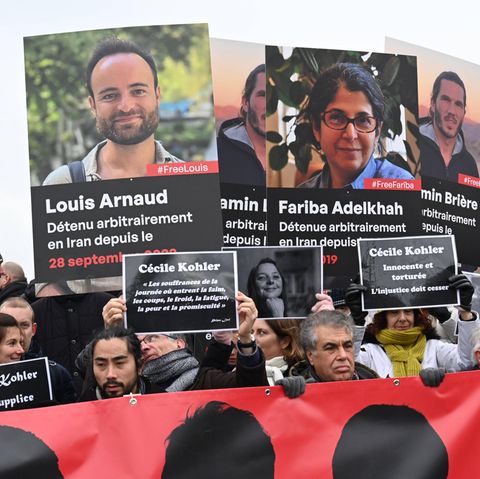Sharmahd execution
Federal government closes all Iranian consulates general – Iran protests
Copy the current link
The federal government waited three days after Iran executed a German citizen. Now the reaction is harsher than many expected.
In response to the execution of German-Iranian dual citizen Djamshid Sharmahd, the federal government is closing all three Iranian consulates general in Germany. As the Foreign Office announced, these are the diplomatic missions in Frankfurt am Main, Hamburg and Munich, but the embassy in Berlin remains open.
This affects 32 Iranian consular officials who will lose their right of residence and have to leave the country unless they also have German citizenship. The reaction to the execution is harsher than many expected.
Iran has condemned the closure of its three general consulates and summoned the charge d’affaires of the German embassy in protest. Foreign Minister Annalena Baerbock’s decision to deny Iranians and Germans consular services in Germany was “unjustified,” the Iranian Foreign Ministry said in a press release on the Internet portal “Iran Nuances.”
The Foreign Ministry called the federal government’s protest interference in internal affairs. It is unclear whether Tehran will take any further measures in addition to the summons. However, observers in Tehran expect tougher steps.
So far, the federal government has only resorted to such a punitive measure once: As a result of the attack on Ukraine, four Russian consulates general were closed, albeit with a delay. The decision was only made 15 months after the invasion in May 2023 in response to the expulsion of hundreds of German civil servants and was not implemented until the turn of the year 2023/24.
Baerbock: Diplomatic relations with Iran at their lowest point
Baerbock said diplomatic relations with Iran are “more than at a low point.” The murder of Sharmahd underlines that the Iranian “unjust regime” continues to act with complete brutality even with the recent change at the top, said the minister. The regime primarily knows the language of blackmail, threats and violence. “We have repeatedly made it clear to Iran that the execution of a German national will have serious consequences.”
The Iranian embassy in Berlin remains open and is still responsible for consular support for the 300,000 Iranians in Germany. The Foreign Office does not provide any information about the number of employees at the embassy. Baerbock said that closing these would be the biggest favor that could be done to such regimes, according to Baerbock. “We know there is also another Iran.”
Iran’s judiciary announced Sharmahd’s execution on Monday. He was sentenced to death in spring 2023 in a controversial trial following terrorism allegations. The federal government, relatives and human rights activists vehemently rejected the allegations against him.
New low in German-Iranian relations
The already severely restricted German-Iranian relations have reached a new low with the closure of the consulate general. It is quite possible that Iran will take countermeasures.
After the death sentence against Sharmahd, the Foreign Office expelled two Iranian diplomats. Iran, for its part, responded by expelling the same number of German diplomats. This is a common procedure in such cases.
The European Union is also discussing further sanctions against Iran. This could involve people involved in the execution, imprisonment or trial that the federal government considers to be contrary to the rule of law.
Baerbock had announced “serious consequences”.
Chancellor Olaf Scholz (SPD) and Baerbock had already strongly condemned the execution on Monday. Baerbock announced “serious consequences” and had the head of the Iranian embassy in Berlin summoned to the Foreign Office. In a conversation with him, State Secretary Susanne Baumann conveyed her “strong protest against the actions of the Iranian regime.”
There is currently no Iranian ambassador in Berlin. The previous ambassador left as part of a regular personnel change and a successor has not yet arrived. After Sharmahd’s killing, it is unlikely that a new ambassador will be sent any time soon.
The Foreign Office warns against traveling to Iran
The German ambassador in Tehran, Markus Potzel, was ordered back to Germany by Baerbock for “consultations”. He has now left Iran. When he will return is also completely unclear.
The Foreign Office warns against traveling to Iran and has already asked German citizens to leave the country. It is unclear how many Germans are still in the country. A low three-digit number has been registered on the Federal Foreign Office’s crisis preparedness list.
Sharmahd was born in Tehran in 1955, came to Germany at the age of seven and grew up in Lower Saxony, where he ran a computer shop in the state capital Hanover for years. In 2003 he finally moved to California in the USA, where he became politically active.
In the USA, Sharmahd was active in the Iranian exile opposition group “Tondar” (Thunder). The Iranian government accuses the monarchist organization of being responsible for an attack in 2008 in the city of Shiraz that left several people dead. The allegations cannot be independently verified – relatives of the dead had called for Sharmahd’s execution.
Critics described the trial against Sharmahd as grossly unfair. He was not allowed to choose his own lawyer and his whereabouts remained unknown until the end. Confessions broadcast on state television may have been obtained under torture. The Sharmahd trial was presided over by Abolghassem Salawati, also known as the “Judge of Death,” who was sanctioned by the United States and the European Union.
Note: This article has been updated to include further information.
DPA
tis / mkb, by Michael Fischer
Source: Stern
I have been working in the news industry for over 6 years, first as a reporter and now as an editor. I have covered politics extensively, and my work has appeared in major newspapers and online news outlets around the world. In addition to my writing, I also contribute regularly to 24 Hours World.





